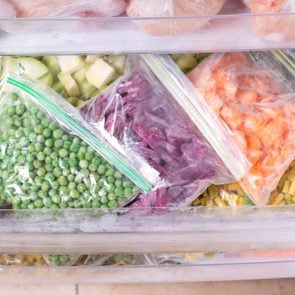How Long Does Food Last in the Fridge?
Updated: Aug. 09, 2023
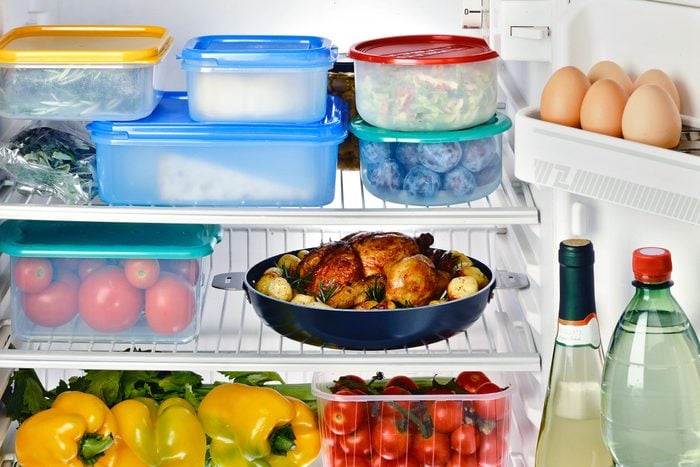
How long food lasts in the refrigerator shouldn't be a mystery. Experts reveal just how long each type of food is good in the fridge.
Do you really know how long food lasts in the fridge? Unless there’s visible mold or a funky smell that can’t be ignored, most of us are probably just winging it. But the truth is, like fridge organization, there’s a science to the shelf life of foods kept in the refrigerator. Of course, the rules vary for the main food groups versus condiments and even leftover foods. So, how long is food good in the fridge?
To answer that question accurately, you need to consider the type of food, whether it’s open or unopened and, of course, the sell-by date stamped on it. Luckily, we don’t have to worry about nonperishable foods spoiling, but items like eggs, meat, dairy and produce have a much shorter shelf life, even if you keep your appliances at the proper temperatures (at or below 40 degrees for the fridge and 0 degrees for the freezer).
There’s no need to keep guessing and risk getting sick. We gathered all the answers right here. Find out exactly how long your food will stay fresh in the fridge so you can eat it in time, and you’ll also help reduce food waste and save money on groceries. When you’re up to speed on the basics, learn how long food stays good in the fridge without power, in case of emergency.
Get Reader’s Digest’s Read Up newsletter for more food, home and cleaning tips, travel, tech, humor and fun facts all week long.
How long can meat stay in the fridge?
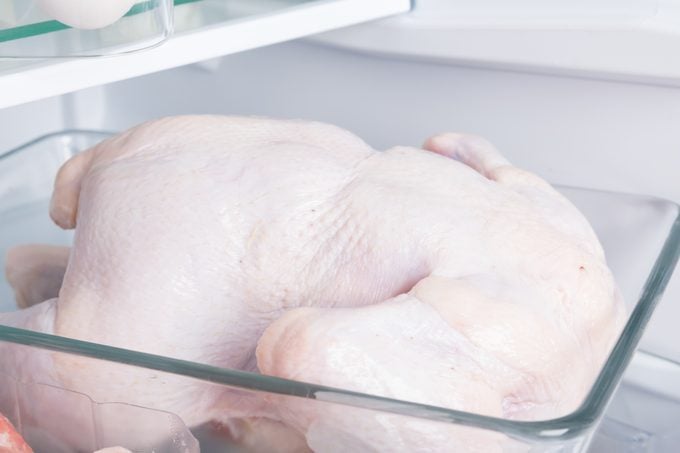
If you remember only one food fact from this story, make sure it’s this one. When you eat meat that’s gone bad, you may be exposing yourself to pathogenic bacteria, which can result in food poisoning. Symptoms could last anywhere from four days to a week, and in some cases, exposure to this bacteria could be deadly.
“Keep all meat, fish and shellfish on the bottom shelf, especially if you are storing it raw, but this is a good practice even if the meat is cooked,” explains Caitlin Clark, a food scientist and chocolate researcher at Colorado State University. “These foods host pathogens and spoilage microbes that may drip on your other food.”
To avoid eating spoiled meat, check out these meat storage guidelines and learn how long chicken lasts. And print out the chart below for easy reference.
| Food | Days in Fridge |
| Chicken, raw | 2 days max |
| Chicken, cooked | 3–4 days |
| Beef, raw | 5 days |
| Beef, cooked | 3–4 days |
| Bacon, raw | A week after opening, but up to two weeks if unopened |
| Bacon, cooked | 5 days |
| Ground meat, raw | No more than 2 days |
| Ground meat, cooked | No more than 4 days |
| Pork, raw | 2 days max |
| Pork, cooked | 4 days |
| Ham | A week if whole, but only about 4 days if sliced |
How long can fish stay in the fridge?
Eating spoiled fish isn’t a pretty sight either. Food poisoning from fish is called scombroid, and it occurs when people eat fish that hasn’t been properly stored. This is extra tricky because fish affected by scombroid may not look, smell or taste any different—and that’s why it’s so important to know exactly how long fish lasts.
In general, “both the USDA and FDA recommend that lean and fatty fish, as well as shellfish, should only be stored for one to two days in the fridge raw,” says Clark. “But after cooking, these foods will last up to four days in the fridge.” These recommendations apply to salmon, tuna and shrimp, as well as other types of shellfish (such as lobster and crawfish) and seafood like scallops and squid.
| Food | Days in Fridge |
| Fatty fish (bluefish, catfish, mackerel, salmon, tuna, etc.) | 1–3 days |
| Lean fish (cod, flounder, haddock, halibut, sole, sea trout, etc.) | 1–3 days |
| Fresh crab meat | 2–4 days |
| Fresh lobster | 2–4 days |
| Live crab or lobster | 1 day |
| Live clams, mussels, oysters and scallops | 5–10 days |
| Shrimp and crayfish | 3–5 days |
| Shucked clams, mussels, oysters and scallops | 3–10 days |
| Squid | 1–3 days |
How long do eggs last in the fridge?
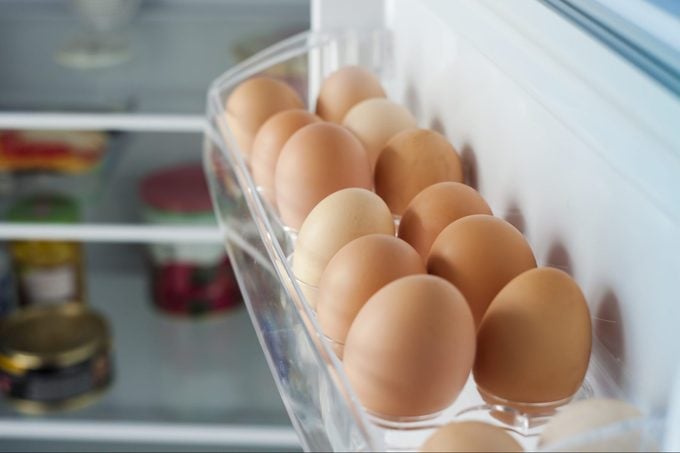
Eggs can stay in the fridge for a surprisingly long time. However, as we all know, they do go bad eventually, and you should know how to tell if eggs are still good before eating them or even cracking them open. And is it safe to eat expired eggs? Here are some handy guidelines.
| Food | Days in Fridge |
| Eggs, raw in shell | 3–5 weeks |
| Raw egg whites and yolks | 2–4 days |
| Hard-boiled eggs | 1 week |
| Egg substitutes, liquid but unopened | 1 week, or consult the use-by date |
| Egg substitutes, liquid but opened | 3 days |
| Egg substitutes, frozen, unopened | After thawing, 1 week or consult the use-by date |
| Egg substitutes, frozen, opened | After thawing, 3–4 days or consult the use-by date |
How long do dairy products last in the fridge?
Just thinking about the smell of spoiled milk is enough to turn your stomach. So, how long does milk last, and when should you toss it? “If milk has not been opened, it may stay good for up to a week past its sell-by date,” Clark says. “In contrast, opened milk is only good for about two days past its sell-by date.”
And milk shouldn’t be your only concern. Butter, cheese and really anything that contains dairy should also be thoroughly inspected. “Butter can be safely stored in the fridge for up to three months, according to USDA recommendations,” Clark notes. “If you wish to leave butter at room temperature to keep it soft, do so in a butter crock that protects it from light and air. Under these conditions, it can stay good for up to two weeks.”
As for cheese, harder varieties (think cheddar and Parmesan) are, well, hardier and will last longer in the fridge. Soft cheeses will spoil a lot sooner—especially once you open the seal.
| Food | Days in Fridge |
| Milk, unopened | Up to a week past its sell-by date |
| Milk, opened | 2 days past its sell-by date |
| Butter, wrapped tightly | 1–3 months |
| Soft cheeses, unopened (brie, chèvre, etc.) | 1–2 weeks |
| Soft cheeses, opened | 1 week from when the seal is broken |
| Hard cheeses, unopened (cheddar, jack, Parmesan) | 6 months |
| Hard cheeses, opened | 1 month |
How long does produce last in the fridge?
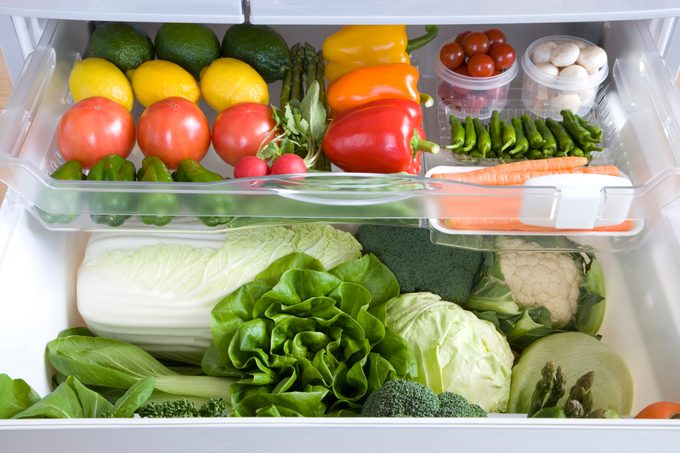
How long produce lasts in the fridge is directly correlated to your fruit and vegetable storage methods. “At best, fresh leafy greens will last about a week in the fridge,” explains Brian Nagele, a culinary expert and the CEO of Restaurant Clicks. “However, this will only hold true if it’s bagged and stored in the crisper.” One of the main reasons produce spoils in the fridge is because of freezer burn, he adds. This happens when greens are stored on the upper shelves and toward the back of the appliance. “The crisper protects produce from these harsh temperatures to extend its freshness for a few extra days.”
There are also some interesting tricks that will make strawberries last longer, as well as tomatoes. “The trick is to wash tomatoes under running water before storing them in the fridge,” says Nagele. “Dirt and other market contaminants may linger on the surface of tomatoes and cause them to spoil within as little as a few hours post-harvest. Proper food hygiene practices are essential for preserving natural products.”
| Food | Days in Fridge |
| Apples | 4–6 weeks |
| Broccoli | 3–5 days |
| Carrots | 2–3 weeks |
| Celery | 1–2 weeks |
| Mushrooms | 3–7 days |
| Strawberries, in 32°F | Up to 2 weeks |
| Strawberries, in 41°F | 3 days |
| Tomatoes | Until ripe, then 7 days (though the USDA recommends pantry storage) |
How long do leftovers last in the fridge?
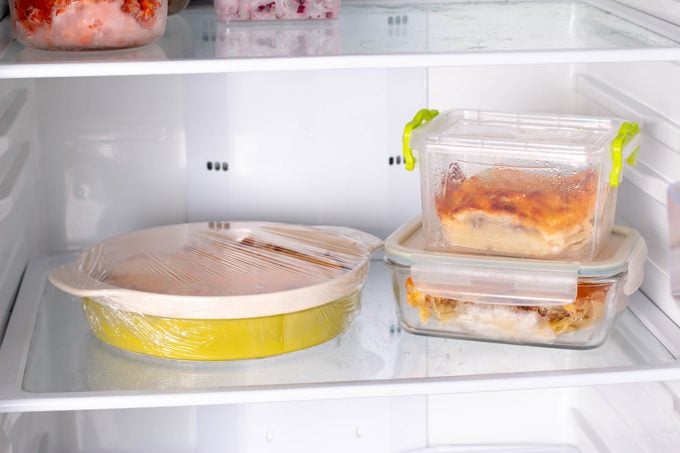
Like most other foods, your leftovers will last longer if you store them properly. That means putting them into sealed, airtight containers. Do that, and they’ll last three to four days in the fridge, regardless of the food category.
Why not longer? As Clark notes, most leftovers have a few things in common. First, they generally combine multiple ingredients, which provides a nutrient-rich breeding ground for bacteria. Second, they have usually been touched by kitchen tools, surfaces and human hands—all of which are heavy sources of contamination. And third, they are often chopped, blended, sliced or otherwise manipulated in a way that increases their surface area, which makes them susceptible to faster spoilage. Fourth, despite many people’s best efforts, they have often been “temperature abused.”
“For all these reasons,” Clark says, “when food is placed in the refrigerator as leftovers, it already contains a heavy bacterial load, so even at cold temperatures, it simply won’t last long.”
| Food | Days in Fridge |
| Pizza | 3–4 days |
| Chinese food | 3–4 days |
| Sushi, with raw fish | No more than 2 days |
| Sushi, with cooked fish | Up to 4 days |
| Pasta sauce jar, opened | 4–5 days |
How long do condiments last in the fridge?
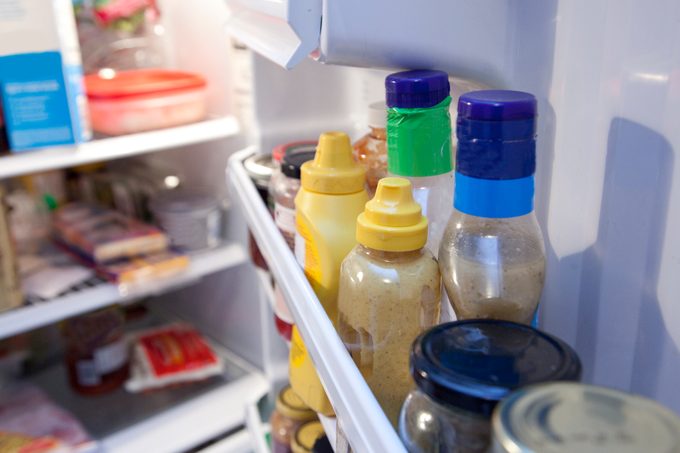
Fess up: Do you have an entire refrigerator shelf dedicated to condiments you almost never use? It’s OK—we all do! But it’s important to know how long these condiments can last, so you know when to replace them before they go bad. That goes for everything from jam and jelly to ketchup and mustard.
Perhaps most surprising is that salad dressing doesn’t last as long as you probably think it does. “Most salad dressings contain high amounts of fats, which are prone to oxidation and rancidity once the bottle is opened,” Clark says. “That’s why they can be stored indefinitely in the pantry. But once they are opened, they are only good for about two months and must be stored in the fridge.”
| Food | Days in Fridge |
| Ketchup | 6 months |
| Cocktail or chili sauce | 6 months |
| Salad dressing, opened | 2 months |
| Peanut butter, opened | 6–8 months |
| Jam or jelly, opened | 6 months |
| Horseradish | 3–4 months |
| Olives | 2 weeks |
| Pickles | 1–3 months |
Sources:
- Caitlin Clark, food scientist and chocolate researcher at Colorado State University
- Brian Nagele, culinary expert and CEO of Restaurant Clicks
- FoodSafety.gov: “Cold Food Storage Chart”
- NHS Inform: “Food Poisoning”
- Poison Control: “Food Poisoning from Fish: Scombroid”
- USDA: “How long can you store fruits and vegetables?”
- FoodSafety.gov: “FoodKeeper App”


